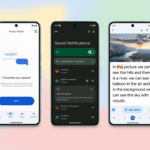The healthcare industry was surprised, challenged, and inspired by generative artificial intelligence (gen AI) in 2023. Some tools were launched to assist healthcare organizations, including MedLM, a family of foundation models fine-tuned for healthcare industry use cases, and Vertex AI Search for healthcare, designed to help find the right information and gain insights from it. In 2024, we will see this technology moving from experimenting and trial to real-world use cases, particularly in areas that reduce administrative burdens, help clinicians easily find information, assist healthcare call center agents, and ultimately help organizations run more efficiently. In addition, gen AI will continue to be experimented with for use cases that require more testing and development, like assimilating information from diverse sources such as medical images, textual clinical reports, and voice, ultimately driving a new understanding about health and healthcare.
The following predictions are based on short-term optimization, long-term transformation, and profound learning, but they are interconnected. The initial steps taken to remove near-term paperwork burdens will play a role in the overall understanding of gen AI and best practices in healthcare, influencing the big changes expected over the coming decade. Sweeping changes don’t arrive like a thunderbolt; they’re built incrementally and will likely occur in 2024.
Optimizing Administrative Work with Gen AI
The healthcare industry faced cost pressures, staffing shortages, fragmented technologies, and administrative complexities due to the challenging past years. Gen AI can help relieve some of these pressures by enabling easier document creation, helping ease the administrative workload for short-staffed clinicians. It can also ease the cognitive burden on caregivers by assisting with clinical documentation, easily finding relevant information, and by helping radiologists, pathologists, and lab workers in going through large sets of results.
According to the World Health Organization, there were about 28 million nurses in the world in 2020. Saving them just five minutes a day could result in 266 years better focused on patient care. Incremental changes at scale create enormous change and can enhance the appeal of the nursing profession, leading to less burnout, more satisfaction, and, ultimately, restoring joy to medicine.
Preparing for Broad Transformation Built on Gen AI
Gen AI’s efficiencies and better services may seem incremental at first, but in the long term, they will pave the way for improved clinical documentation, more effective doctor-patient interactions, and better health outcomes for patients. Since AI is providing breakthroughs in previously uncharted territories like protein folding and doing transformational work to better understand existing data, it has the potential to enhance the patient care experience and contribute to the overall improvement of population health.
Deepening Our Understanding of the Best Ways to Use Gen AI in Healthcare
Gen AI will contribute to a growing understanding of healthcare by regulators, researchers, doctors, and healthcare organizations, leading to more equitable and effective care for patients. Over time, we will see a long-term transformation of wisdom.









